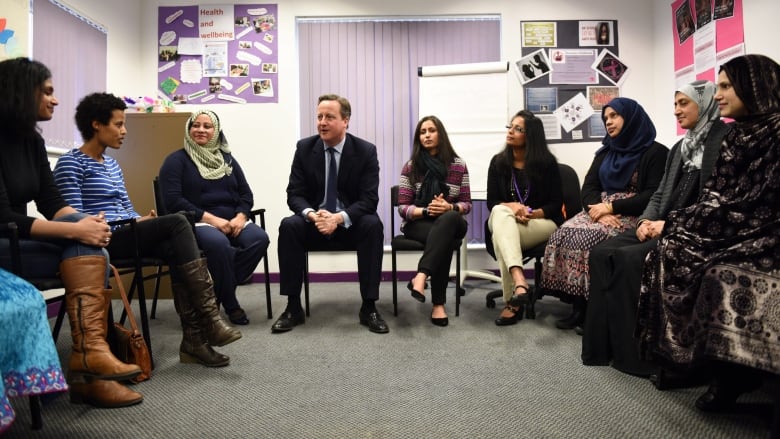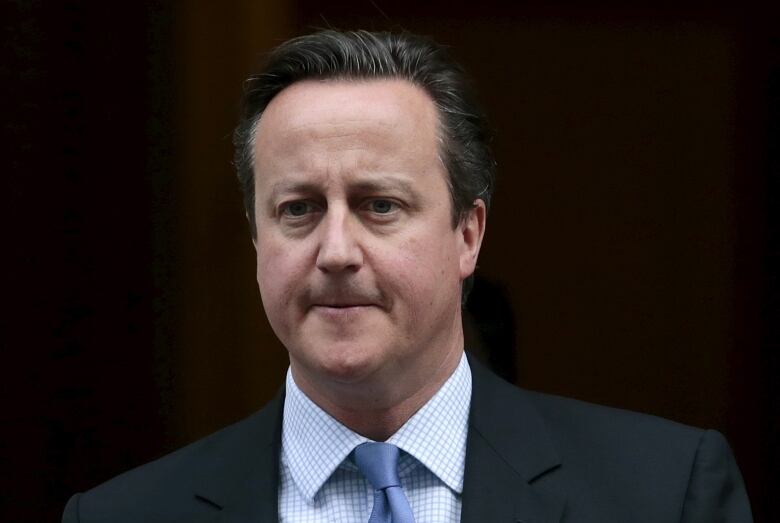British PM David Cameron's anti-extremism efforts called worthy but tone-deaf
Issues relating to the Muslim community too often linked to extremism

British Prime Minister David Cameron received a wave of criticism last Monday after announcing a $40-million fund to help female Muslim immigrantslearn English.
The lessons, he argued,would help the women better integrateand throw off the stifling influence of a "minority" of Muslim men whoexert "damaging control" over female relatives.
- British PM's push for Muslim women to learn English criticized online
- ISIS video of boy, executioner 'desperate propaganda'
- British comedian tackles extremism 1 laugh at a time
"If you're not able to speak English, you're not able to integrate. You may find, therefore, that you have challenges understanding what your identity is and you could be more susceptible to the extremist message that comes from [ISIS]," Cameron told the BBC.
Cameron linking the ability to speak English with the fight against extremism proved problematic.
The Guardian newspaperoften critical of Cameronpublished an editorial saying the lessons could have been seen as empowering but by linking them to extremism, Cameron sounded "as if he was once again scolding Muslims."
Shaista Gohir, chair of the Muslim Women's Network UK said the connection would only further stigmatize the Muslim community.
"A lot of people are very angry, outraged," she said. "We can discuss issues relating to the Muslim community without always having to connect it to extremism and radicalization."
'Struggle of our generation'
Suchstrong reaction is nothing new for Cameron.
Over the past year, he has repeatedly stirred up angry responsesfrom British Muslims whilespeaking about his government's plansto combat extremist ideologya fight he hasdescribed as the "struggle of our generation."

It's not always the policies themselves fuelling thenegative reaction, saysGohir, but rather theway they are communicated.
Just over a year ago, Cameron found himself on the defensive aftera letter sent to Muslim community leadersby one of his government officialsurged them to do more to fight extremism.
Theletter which came after deadlyattacks in Paris on CharlieHebdomagazine and a Jewish supermarket called on leadersto"more clearly than ever before" demonstrate what it meant to be a British Muslim andexercise their "important responsibility" in explaining "how faith in Islam can be part of British identity."
The Muslim Council of Britain (MCB) reactedangrily,arguingagainst the letter's tone and "the implication" that Muslims had not done enough to challenge terrorism.
Then in June, when Cameron warned some Muslim communitiesmay "quietly condone" ISIS by not confronting early signs of extremism, he drew further criticism from Muslims and non-Muslims alike.
Critics accused him ofscapegoatingthe entire Muslim community by implying extremism was intrinsic within it.
The Muslim councilhas even gone so far as to argue Cameron's official strategyto snuff out homegrown extremism, dubbed the "One Nation Counter-Extremism Strategy,"has"McCarthyistundertones."
'We are just as angry'
Gohirsays there is currently a high level of alienation among British Muslims, which she argues ispartly the resultof the government's statementsand the fallout from recent eventslike the Paris attacks.
Police statistics released at the end of last year show hate crimes against Muslims in Londonhad increased. And a survey of more than 6,000 British citizenscommissioned by the charity Islamic Relief and carried out last summer byYouGov, a U.K. research firmshowed that "terrorism" was at the top of the list when it came to wordsassociated with Muslims.

Gohir suggeststhat stigmatizationcould be reduced if the government reached out to the Muslim community more frequentlywithout invoking the fight against extremism.
"The vast majority of Muslims are on the government's side," she said. "We are just as angry with these extremists. In fact, we suffer more because of them because we get thebacklash."
'Right direction,' think-tank says
In spite of the criticism levelled against Cameron, Jonathan Russell, head of policy at theQuilliamFoundation, acounter-extremism think-tank in London, argues that the U.K. has become a world leader in countering extremist narratives under his direction.
"I think the British government is absolutely going in the right direction," Russell said. "Governments around the world can learn a lot from the British prime minister."
He points to Cameron's drive to safeguard young people through such policiesas regulating religious schools and ensuring that anyone convicted of extremism is barred from working with children, along with a new governmentwebsitedesigned to help teachers fightradicalization.
But Russell agrees the government may have a problem when it comes todelivering its message.
"Communicating policy isvery often as important as the policy itself," he said. "The government has not always been very good at talking about counter-extremism, and it's been held back by that."
Importance of perception
The threat posed byextremism ismuch-talkedabout in the U.K.,not least because anestimated 700 British citizens havetravelled abroad to joingroups like ISIS.
British militants likeMohammed Emwazi,the infamous Jihadi John,have also been the face ofsome of the group's most ominous propaganda videos.

And with the challengesposed by extremism only set to continue, the government's communication problem is one it's going to have to quickly solve, said Russell, so that it can work better with "those communities from whom we need buy-in."
"The perception of government policy is crucial to its effectiveness," he said.
And the government has a long way to go, according to Gohir.
"We need to work better together and not sort of pitch it as 'us and them' because that's how it sounds at the moment," she said. "Many people just feel they're all being tarnished negatively with the same brush due to the criminality of a minority of extremists."












_(720p).jpg)


 OFFICIAL HD MUSIC VIDEO.jpg)
.jpg)



























































































